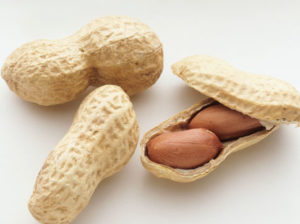 Amazing if this holds up in larger studies - a treatment for peanut allergy! As the researchers said - the treatment (2 grams of peanut protein plus a specific strain of the probiotic Lactobacillus rhamnosus daily for 18 months) provided "persistent suppression of the allergic immune response to peanuts 4 years" after the treatment had ended This was a nicely done multi-year study in children - a randomised, double-blind, placebo-controlled trial (to eliminate biases).
Amazing if this holds up in larger studies - a treatment for peanut allergy! As the researchers said - the treatment (2 grams of peanut protein plus a specific strain of the probiotic Lactobacillus rhamnosus daily for 18 months) provided "persistent suppression of the allergic immune response to peanuts 4 years" after the treatment had ended This was a nicely done multi-year study in children - a randomised, double-blind, placebo-controlled trial (to eliminate biases).
The researchers also wrote in the Discussion section of the study: "PPOIT [combined probiotic and peanut oral immunotherapy] was associated with long-lasting peanut tolerance 4 years after stopping treatment. Two-thirds of PPOIT treated participants were able to continue regular peanut ingestion, and more than half were ingesting moderate to-large amounts of peanut on a regular basis, compared with only one (4%) of 24 placebo-treated participants. Allergic reactions from intentional peanut ingestion were uncommon and all reactions were mild, suggesting that those who achieved PPOIT-induced sustained unresponsiveness can safely continue peanut ingestion." In other words - WOW! (Other posts on peanut allergies - here and here, and earlier progress report of this study.) From Medical Xpress:
Australian researchers in peanut allergy breakthrough
Australian researchers have reported a major breakthrough in the relief of deadly peanut allergy with the discovery of a long-lasting treatment they say offers hope that a cure will soon be possible. In clinical trials conducted by scientists at Melbourne's Murdoch Childrens Research Institute, children with peanut allergies were given a probiotic along with small doses of a peanut protein over an 18-month period. When the experiment ended in 2013 some 80 percent of the kids were able to tolerate peanuts. The research, published Wednesday in medical journal The Lancet, found that four years on, about 70 percent could still eat peanuts without an adverse reaction.
"The importance of this finding is that these children were able to eat peanuts like children who don't have peanut allergy and still maintain their tolerant state, protected against reactions to peanut," lead researcher Mimi Tang said. "These findings suggest our treatment is effective at inducing long-term tolerance, up to four years after completing treatment, and is safe. Food allergy affects one in 20 children and about two in 100 adults, with seafood, cow's milk, eggs and peanuts among the most typical triggers. Peanuts are one of the most common foods to cause anaphylaxis, a potentially fatal allergic reaction.
The researchers said the Murdoch study provides the "strongest evidence yet that a cure may be possible for peanut allergy"..... Ten-year-old Olivia May suffered a reaction when she tried to eat a peanut butter sandwich seven years ago. "We visited the allergist the first time [and] he said 'sorry, you're going to have to go home and empty your pantry out, clear it of all nuts, anything with nuts in it'," Oliver's mother Tanya told the Australian Broadcasting Corporation. But after taking part in the trial, Oliva no longer suffers from her allergy.
Fifty-six children completed the study, with half receiving a placebo and half receiving the treatment, which encourages the immune system to develop a tolerance to the allergy. Researchers are now aiming to confirm the results with a larger study of the treatment they say "holds important implications for attacking the modern food allergy epidemic". [Original study.]
